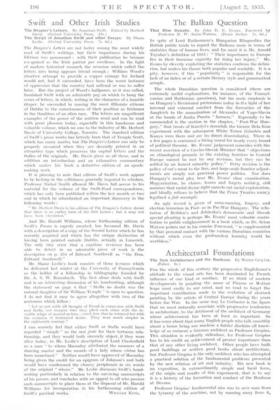The Balkan Question
That Blue Danube. By John D. E. Evans. Foreword by Professor It. W. Seton-Watson. (Denis Archer. 7s. (Id.) IN spite of Lord Rothermere's Hungarian Rhapsodies the British public tends to regard the Balkans more in terms of statistics than of human lives, and for most it is Mr. Arnold Toynbee's definition of 14115: " Their importance to Europe lies in their immense capacity for doing her injury." Mr. Evans by cleverly exploiting the statistics confirms the defini- tion, but makes his theme both popular and readable. It is a pity, however, if this " popularity " is responsible for the lack of an index or of a certain literary style and grammatical scruple.
The whole Danubian question is considered (there are extremely useful explanations, for instance, of the Transyl- vanian and Ruthenian questions), but the main emphasis is on Hungary's Revisionist .pretensions today in the light. of her internal and external conduct from the formation of the Ausglcich to the assassination of Alexander of Yugo-Slavia at the hands of Janka •Puszta " farmers." Especially to be commended is the section . in the chapter, . " Post-War. Hun- gary," that treats of Karolyi's downfall, the bizarre Bela.hain experiment with the subsequent White Terror (Gomblis and Kenya were there and are its direct descendants). There in a few pages is contained a biting moral for nearly every brand of political theorist.. Mr. Evans'. judgement coincides with the recent assertion of a Czecho-Slovak Minister that " objections on ethnological grounds to the existing frontiers in. Central Europe cannot be met by any revision, but they can be settled by an honest minority policy." Petty revision is the policy of cat's meat to the lion, and large-scale frontier adjust- ments are simply not practical power politics. Nor does Hungary's. moral plea bear Mr. Evans' close examination. Magyarization, he claims, learns and forgets nothirg, still assumes that racial divine right cancels out racial exploitation, and blindly refuses to believe that the Peace Treaties mere'.y legalized a fait accompli.
An ugly record is given of arms-running, forgery, and election terrorism in Post- as in Pre-War Hungary. The refu, tation of Bethlen's and Jeldieska's democratic and Slovak special pleading
is perhaps Mr. Evans' most valuable contri- bution to public enlightenment in a book which, as Dr. Seton Watson points out in his concise Foreword, " is supplemented by that personal contact with the various Danubian countries without which even the profoundest learning would be worthless."






































 Previous page
Previous page